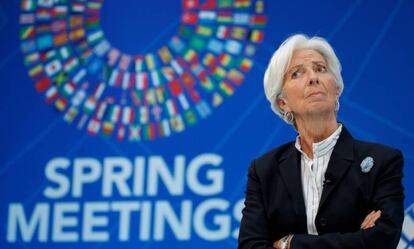Cherry blossoms and nervous bankers
While there is consensus that the capitalist system needs major reforms, there is no agreement on what these reforms should be

In March 1912 the mayor of Tokyo, Yukio Ozaki, gave the city of Washington D.C. 3,020 cherry trees. The saplings adapted well to their new surroundings and, over time, spread throughout the capital and its suburbs. So, for 107 years, springtime in Washington has brought the gorgeous spectacle of the cherry blossoms.
But cherry blossoms are not the only things that arrive in numbers here each spring. With them come bankers from every corner of the globe. Thousands of them. They flock here for the Spring Meetings of the International Monetary Fund (IMF) and the World Bank, who invite the finance ministers and central bankers of virtually every nation. Last week, 2,800 of them arrived. They were joined by 800 journalists, 350 representatives of various international organizations, and countless private bankers who came to meet them and other clients. All of them come hoping to get a better read on the pulse of the global economy.
Politicizing central banks would add even more uncertainty to an international financial system that has not yet fully recovered from the 2008 crisis
This year, the bankers were worried. Gina Gopinath, the IMF chief economist, has warned of strong headwinds to economic progress, predicting that 70% of the world economy will grow slower this year. Latin America and Europe will be hardest hit. The factors contributing to the slowdown are many and varied, but they include Trump’s ongoing trade wars with China and Europe, possible tightening of financial markets, a slowing Chinese economy, Brexit, and the uncertainty about which economic policies will be adopted by a significant number of countries.
As is typical of these massive conventions, what matters isn’t what happens at the official sessions, but what is heard in the corridors and discussed behind closed doors. One issue that is not on the official agenda, but was talked about incessantly, was the growing threat to the independence of central banks. Their independence often irritates heads of state who would prefer to have control of their country's monetary policy. President Trump, for example, has fiercely criticized the Federal Reserve for raising interest rates. Higher interest rates tend to contract economic activity, something that no president wants. But, on the other hand, leaving interest rates too low can stimulate inflation, something that is unacceptable to central banks. The fundamental mission of these institutions is to contribute to economic stability and, especially, to prevent prices from rising. This tension between the preferences of chief executives and the objectives of their central banks always exists, and for this reason it is important to protect them from the political pressures that they are often subjected to.
Not surprisingly, this year’s attendees in Washington were concerned about President Trump's push to place two political allies, Stephen Moore and Herman Cain, on the Board of Governors of the Federal Reserve. Moore and Cain simply don’t have the credentials and experience to make informed decisions on the monetary policy for the world's most important central bank. Moore himself admitted, "I’m not an expert on monetary policy." The concern is not only that Trump’s nominees may be confirmed by the Senate, but that the president’s "capture" of the central bank will set a precedent that legitimizes the move and inspires other leaders with a propensity to concentrate power and undermine the checks and balances of democracy to do the same. The independence of a central bank’s decisions from the president’s electoral interests is an important factor for stability. Politicizing central banks would add even more uncertainty to an international financial system that has not yet fully recovered from the 2008 crisis.
Gina Gopinath has warned of strong headwinds to economic progress, predicting that 70% of the world economy will grow slower this year
Two other concerns were widely discussed at this year's meeting: economic inequality and its implications for political stability. The Organization for Economic Co-operation and Development (OECD), a group that brings together 36 of the most prosperous countries, reported that the standard of living for their middle classes has been stagnant for a decade. Education and housing costs for middle-income families have skyrocketed, while increased automation hits both their employment prospects and their income. Naturally, these conditions have strong political repercussions and have contributed to surprises such as Brexit and the rise, throughout the developed world, of political movements with radical agendas.
A few days ago, instead of attending yet another World Bank seminar, I accepted the invitation of a group of seven bankers to go see the cherry blossoms. It was a very pleasant walk where, inevitably, the conversation focused on all these concerns, and more.
In these types of conversations, consensus is rare. But, to my surprise, there was a clear consensus in our stroll over the need to reform – urgently – the capitalist system.
But what should these reforms consist of?
On that there was no consensus.
Moises Naim is a Distinguished Fellow at the Carnegie Endowment for International Peace
Tu suscripción se está usando en otro dispositivo
¿Quieres añadir otro usuario a tu suscripción?
Si continúas leyendo en este dispositivo, no se podrá leer en el otro.
FlechaTu suscripción se está usando en otro dispositivo y solo puedes acceder a EL PAÍS desde un dispositivo a la vez.
Si quieres compartir tu cuenta, cambia tu suscripción a la modalidad Premium, así podrás añadir otro usuario. Cada uno accederá con su propia cuenta de email, lo que os permitirá personalizar vuestra experiencia en EL PAÍS.
¿Tienes una suscripción de empresa? Accede aquí para contratar más cuentas.
En el caso de no saber quién está usando tu cuenta, te recomendamos cambiar tu contraseña aquí.
Si decides continuar compartiendo tu cuenta, este mensaje se mostrará en tu dispositivo y en el de la otra persona que está usando tu cuenta de forma indefinida, afectando a tu experiencia de lectura. Puedes consultar aquí los términos y condiciones de la suscripción digital.









































